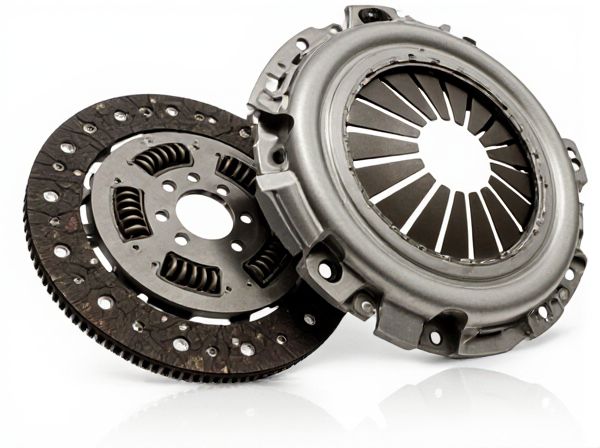
Photo illustration: Cerametallic Clutch vs Organic Clutch
Cerametallic clutches offer superior heat resistance and durability compared to organic clutches, making them ideal for high-performance or heavy-duty applications. Organic clutches provide smoother engagement and quieter operation, which makes them well-suited for everyday driving and comfort. Your choice between the two depends on whether you prioritize longevity and performance or comfort and quietness.
Table of Comparison
| Feature | Cerametallic Clutch | Organic Clutch |
|---|---|---|
| Material Composition | Ceramic fibers and metal composites | Organic resins, rubber, and fiber blends |
| Durability | High resistance to heat and wear | Moderate, wears faster under heavy use |
| Heat Dissipation | Excellent, suitable for high-performance | Average, can overheat in aggressive driving |
| Torque Capacity | Higher torque handling capability | Lower torque capacity, for everyday use |
| Engagement Feel | Stiffer, less smooth engagement | Smoother, more comfortable engagement |
| Cost | Higher upfront cost | More affordable |
| Applications | Performance vehicles, racing, heavy-duty | Passenger cars, daily commuting |
Introduction to Clutch Types
Cerametallic clutches feature a composite of ceramic and metallic materials, offering enhanced durability, high heat resistance, and improved performance in demanding conditions. Organic clutches use natural fibers mixed with resin, providing smoother engagement and quieter operation but tend to wear faster under heavy use. Choosing between cerametallic and organic clutches depends on factors like driving style, vehicle usage, and desired balance between longevity and ride comfort.
What is a Cerametallic Clutch?
A Cerametallic clutch uses a composite material made from ceramic fibers and metal, providing superior heat resistance and durability compared to organic clutches. This type of clutch offers enhanced performance in high-stress and high-temperature environments due to its ability to withstand greater friction and wear. Cerametallic clutches are commonly used in performance vehicles and heavy-duty applications where longevity and reliability are crucial.
What is an Organic Clutch?
An organic clutch is a type of clutch that uses friction materials made from natural fibers, rubber, and resin compounds, providing smooth and quiet engagement ideal for everyday driving. It offers excellent grip and durability at moderate temperatures, making it suitable for typical passenger vehicles and light-duty applications. Compared to cerametallic clutches, organic clutches prioritize comfort and reduced wear but may wear faster under heavy load or high-performance conditions.
Key Material Differences
Cerametallic clutches feature a composite friction material composed of ceramic fibers and metal particles, providing enhanced heat resistance and durability compared to organic clutches. Organic clutches utilize a friction surface made from resin-based compounds mixed with fibers such as Kevlar or carbon, resulting in smoother engagement and reduced noise but lower heat tolerance. The key material difference lies in cerametallic's superior thermal stability and strength, making it ideal for high-performance and heavy-duty applications, whereas organic clutches are preferred for everyday driving due to their comfort and quieter operation.
Performance Comparison
Cerametallic clutches offer superior heat resistance and durability, making them ideal for high-performance and heavy-duty applications where consistent grip and longevity are crucial. Organic clutches provide smoother engagement and better noise reduction, suited for everyday driving with less aggressive power demands. Performance-wise, cerametallic clutches excel in high-friction, high-temperature environments, while organic clutches prioritize comfort and moderate wear in standard conditions.
Durability and Longevity
Cerametallic clutches offer superior durability and longevity due to their resistance to heat and wear, making them ideal for high-performance and heavy-duty applications. Organic clutches, while providing smoother engagement and quieter operation, typically exhibit faster wear rates and shorter lifespan under intense driving conditions. The enhanced heat tolerance of cerametallic materials significantly reduces clutch fade and extends service intervals compared to organic counterparts.
Driving Comfort and Noise
Cerametallic clutches offer superior heat resistance and durability, resulting in consistent performance and minimal slippage under high stress, but they tend to produce more noise and a stiffer pedal feel, potentially reducing driving comfort. Organic clutches provide a smoother engagement with quieter operation, offering enhanced driving comfort ideal for everyday use, though they may wear out faster and are less suitable for aggressive driving conditions. Drivers prioritizing noise reduction and smoothness favor organic clutches, while those seeking longevity and performance under heavy loads opt for cerametallic options despite increased noise and pedal stiffness.
Cost and Maintenance Factors
Cerametallic clutches feature a higher upfront cost but offer extended durability and reduced maintenance frequency compared to organic clutches, making them cost-effective in the long run. Organic clutches are less expensive initially but tend to wear out faster and require more frequent replacements, increasing overall maintenance costs. Choosing between cerametallic and organic clutches depends on balancing initial investment against ongoing maintenance expenses and vehicle usage intensity.
Applications: Who Should Use Each Type?
Cerametallic clutches are ideal for high-performance vehicles, racing applications, and heavy-duty trucks due to their superior heat resistance and durability under extreme conditions. Organic clutches are best suited for everyday driving, commuter cars, and vehicles where smooth engagement and quieter operation are prioritized. Drivers seeking longevity with less maintenance typically choose cerametallic clutches, while those valuing comfort and reduced noise prefer organic options.
Conclusion: Choosing the Right Clutch for Your Needs
Cerametallic clutches offer superior durability and heat resistance, ideal for high-performance or heavy-duty applications, while organic clutches provide smoother engagement and quieter operation suited for everyday driving. Selecting the right clutch depends on balancing driving conditions, performance demands, and budget constraints. Understanding these key factors ensures optimal clutch performance and longevity tailored to your specific automotive needs.
 caratoz.com
caratoz.com